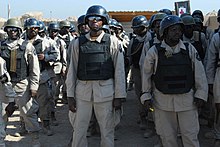
Back Private militêre maatskappy Afrikaans Прыватная ваенная кампанія Byelorussian Empresa militar privada Catalan Privates Sicherheits- und Militärunternehmen German Empresa militar privada Spanish Sõjaline erakompanii Estonian شرکت نظامی خصوصی Persian Palkka-armeija Finnish Société militaire privée French Perusahaan militer swasta ID

A private military company (PMC) or private military and security company (PMSC) is a private company providing armed combat or security services for financial gain. PMCs refer to their personnel as "security contractors" or "private military contractors".
The services and expertise offered by PMCs are typically similar to those of governmental security, military, or police but most often on a smaller scale. PMCs often provide services to train or supplement official armed forces in service of governments, but they can also be employed by private companies to provide bodyguards for key staff or protection of company premises, especially in hostile territories. However, contractors that use armed force in a warzone may be considered unlawful combatants in reference to a concept that is outlined in the Geneva Conventions and explicitly stated by the 2006 American Military Commissions Act.[1]
The services of private contractors are used around the world. P. W. Singer, the author of Corporate Warriors: The Rise of the Privatized Military Industry, stated, "In geographic terms, it operates in over 50 countries. It's operated in every single continent but Antarctica."[citation needed] Singer noted that in the 1990s, there were 50 military personnel for every contractor and that the ratio is now 10 to 1.[when?] He also pointed out that the contractors have a number of duties, depending on who hires them.[citation needed] In developing countries that have natural resources, such as oil refineries in Iraq, they are hired to guard the area. They are hired also to guard companies that contract services and reconstruction efforts such as General Electric.
Apart from securing companies, they secure officials and government affiliates. Private military companies carry out many missions and jobs. Some examples have included close protection for Afghan President Hamid Karzai and piloting reconnaissance airplanes and helicopters as a part of Plan Colombia.[2][3] According to a 2003 study, the industry was then earning over $100 billion a year.[4]
According to a 2008 study by the Office of the Director of National Intelligence, private contractors make up 29% of the workforce in the United States Intelligence Community and cost the equivalent of 49% of their personnel budgets.[5]
- ^ Barnes, Julian E. (October 15, 2007). "America's own unlawful combatants?". Los Angeles Times. Archived from the original on December 20, 2008.
- ^ Vieira, Constanza (July 17, 2007). "COLOMBIA-ECUADOR: Coca Spraying Makes for Toxic Relations". IPS. Archived from the original on January 18, 2008.
- ^ Private Security Transnational Enterprises in Colombia Archived 2008-04-17 at the Wayback Machine José Alvear Restrepo Lawyers' Collective February, 2008.
- ^ Yeoman, Barry (June 1, 2003). "Soldiers of Good Fortune". Mother Jones. Archived from the original on May 20, 2007. Retrieved May 8, 2007.
- ^ Priest, Dana (2011). Top Secret America: The Rise of the New American Security State. Little, Brown and Company. p. 320. ISBN 978-0-316-18221-8.
© MMXXIII Rich X Search. We shall prevail. All rights reserved. Rich X Search